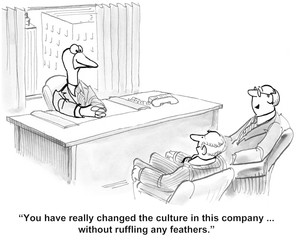Sam Lee Mohan, Founder at GBC, 5 min read

I’ve had many people say to me, “Come on, how can I influence my company culture when I’m not at the top?” Sure, it’s easier when you have the authority to influence behaviours and change through directive. However, is it sustainable if culture-change is not influenced by belief?
Being a leader in the company is not required to influence company culture. If you’re an employee or a middle manager and you’re frustrated with the status quo in your company, all is not lost. Culture has nothing to do with what your job title on your nameplate says. It has everything to do with your beliefs, words, and actions as an individual.
Culture is made up of people after all — people who decide what artifacts, espoused values and beliefs, and basic underlying assumptions are true for a team. Any one person can influence culture, not just the CEO.
Regardless of what position you hold in the company, here are few ways you can create an environment for the culture you want to take form:
Model what you’d like to be true of your team.
Let’s say your Manager isn’t great at time keeping and showing that he’s interested in what you have to discuss. If time-keeping is something that you think should be part of your company’s culture then, ask yourself…”do I do time keeping well myself?”. When any member of your team or peer invites you to a meeting; do you turn-up on-time, a couple of minutes early, late or not at all? Take a long hard look at yourself as a starting point for the kind of company culture you aspire to have.
By modelling the behaviours, you like for your company, you can make it known and visible of the aspects that can be improved. Once your behaviours become cultural to you – your team, and/or colleagues will start to notice and eventually senior management, your CEO or the company owner is bound to notice. They are probably going to say…” Hmm, I like that; perhaps we all should start doing what you’re doing”.
In other words, don’t just wait for someone else to change before you take steps towards change.
Constructive feedback is a responsibility.
In your last one-to-one meeting with your direct line manager, have you told her, constructively, what’s on your mind? Have you told her what you think can be improved (in a respectful manner)? We’re often presented with opportunities like one-to-one meetings, employee engagement surveys, team building and strategy sessions, to voice our opinions and we should use it.
If you feel strongly about something of cultural significance, use any and every opportunity to give management thoughtful feedback about what can be improved.
Constructive feedback is not just an opportunity, it is a responsibility.
Not many realise this but one has to intentionally talk about culture if you want to intentionally shift it. I find it most constructive and powerful when cultural feedback is given in the context of the team. For example, if Business Plan transparency is important for team productivity and trust, then raise the suggested improvement opportunity as, “The team thinks a summarised version of the company Business Plan will enable better transparency and build trust”. This way, your manager, CEO or business owner would appreciate that this is a team view and not an individual pushing a personal agenda.
Also, it’s important not to put your boss on the spot and “corner” her is a team meeting – leaders do not appreciate being ambushed, especially when it could be perceived as a shortcoming on their part.
Rome was not built in a day.
Cultural changes take time. So, as hard as it may seem, stay the course and give it time. It may be a while for the rest of the business to catch on to how you’re influencing culture within the organisation. Some that are resistant to change, may question why you are doing things in a certain way. Don’t be deterred.
With global pressures and the changing business environment, today’s leaders are juggling many priorities, and it may therefore take longer for your actions to be noticed and make a material difference to the culture in your organisation. Don’t give up. At the very least, you can feel proud of modelling the behaviours you expect of others.
As an employee or middle manager, a better company culture can start with you.
Try our most innovative strategic planning software to empower your business to grow & unlock its true potential. StratPlan is free to try!
Looking To Start Your Own Consulting Business? Partner With Us and run your own consulting business the way you want to, working the hours you want to!
Download our eBook “How To Start a Million Dollar Company In Four Steps”
Download of essential eBook to Guiding Strategic Thinking In Your Business for free!
FREQUENTLY ASKED QUESTIONS
Why do I need to fill out the information requested?
We will always keep your personal information safe. We ask for your information in exchange for a valuable resource to (a) improve your browsing experience by personalising the GBC site to your needs; (b) send information to you that we think may be of interest to you by email or other means; (c) send you marketing communications that we think may be of value to you. You can read more about our privacy policy here.
Is this really free?
Absolutely. Just sharing some experience that we hope you’ll find useful. Keep us in mind next time you have strategic planning questions.






